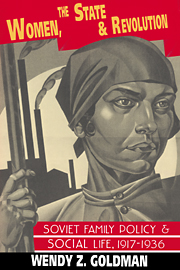Book contents
- Frontmatter
- Contents
- List of tables
- Acknowledgments
- 1 The origins of the Bolshevik vision: Love unfettered, women free
- 2 The first retreat: Besprizornost' and socialized child rearing
- 3 Law and life collide: Free union and the wage-earning population
- 4 Stirring the sea of peasant stagnation
- 5 Pruning the “bourgeois thicket”: Drafting a new Family Code
- 6 Sexual freedom or social chaos: The debate on the 1926 Code
- 7 Controlling reproduction: Women versus the state
- 8 Recasting the vision: The resurrection of the family
- Conclusion: Stalin's oxymorons: Socialist state, law, and family
- Index
- Soviet and East European Studies
6 - Sexual freedom or social chaos: The debate on the 1926 Code
Published online by Cambridge University Press: 26 March 2010
- Frontmatter
- Contents
- List of tables
- Acknowledgments
- 1 The origins of the Bolshevik vision: Love unfettered, women free
- 2 The first retreat: Besprizornost' and socialized child rearing
- 3 Law and life collide: Free union and the wage-earning population
- 4 Stirring the sea of peasant stagnation
- 5 Pruning the “bourgeois thicket”: Drafting a new Family Code
- 6 Sexual freedom or social chaos: The debate on the 1926 Code
- 7 Controlling reproduction: Women versus the state
- 8 Recasting the vision: The resurrection of the family
- Conclusion: Stalin's oxymorons: Socialist state, law, and family
- Index
- Soviet and East European Studies
Summary
Aron Sol'ts: It seems to me that the draft suggested by the Commissariat of Justice is only a formal “step forward.” It has nothing in common with the real steps forward we must take in the areas of culture, life, and development.
Nikolai Krylenko: So, Comrade Sol'ts wants what we now already have. All these countless babi with children, wives suing communists, and communists running from their wives … in one word, all those who protest to him about the current situation. Are they really protesting against the draft? What does Comrade Sol'ts want to change? The draft, which is not yet in effect, or the current law?
Sol'ts: The draft and the current law!
Krylenko: How do you want to change it? Tell us, Comrade Sol'ts, do you want to provide a legal basis for only the first marriage, to establish the right to enter marriage only once? Is that what you want? Is this so, or not so?
Sol'ts: Not so.
Krylenko: No, it is so. If we are to call ourselves Marxists, we must affirm that we cannot struggle with a definite phenomenon of life by punitive norms.
Sol'ts: I didn't suggest this.
Krylenko: Then tell us concretely, what are you suggesting?
By October 1925, the final draft of the new Family Code was affirmed by Sovnarkom (Council of People's Commissars) and submitted to the Central Executive Committee (VTsIK) for ratification. Jurists had taken two years to agree on an acceptable draft, discarding at least three previous versions in an attempt to meet various needs and interests.
- Type
- Chapter
- Information
- Women, the State and RevolutionSoviet Family Policy and Social Life, 1917–1936, pp. 214 - 253Publisher: Cambridge University PressPrint publication year: 1993



